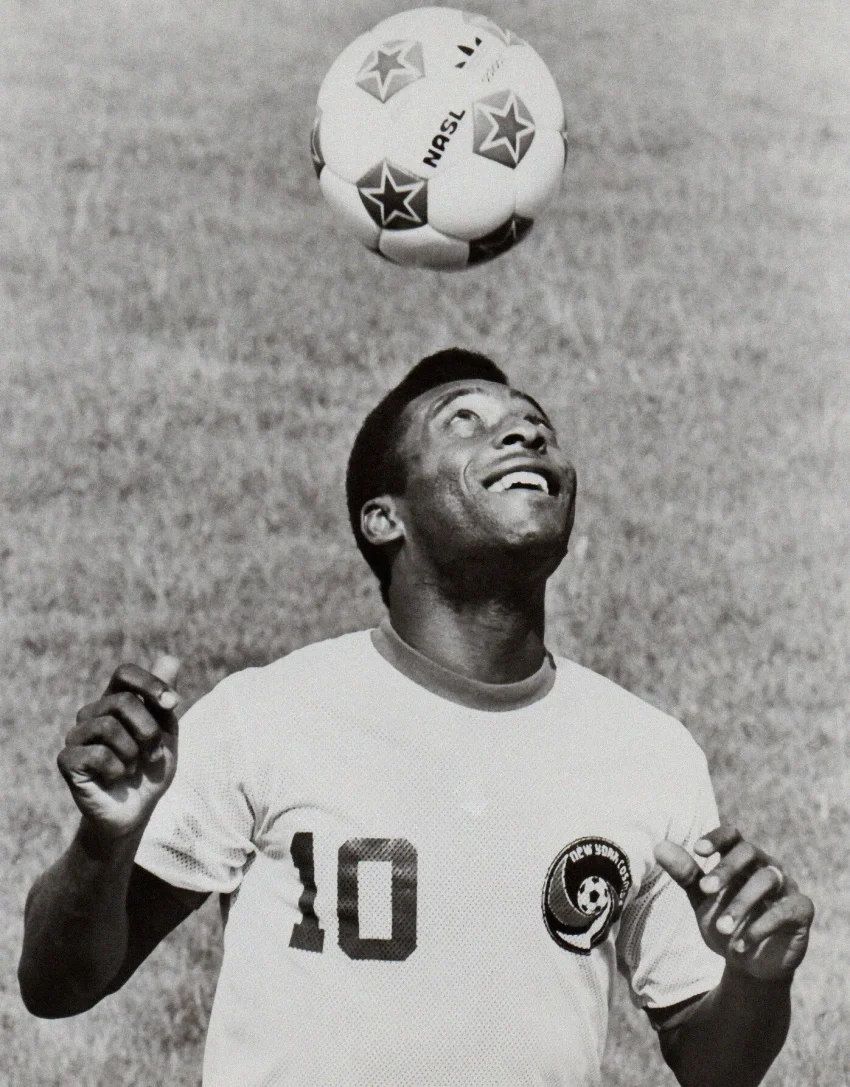Pelé, born on October 23, 1940, in Três Corações, Brazil, is celebrated as a Brazilian soccer legend and often hailed as the greatest footballer of all time. His remarkable journey began when he debuted for the national team at just 16, quickly leading Brazil to three World Cup victories in 1958, 1962, and 1970, showcasing his extraordinary talent on the world stage. With a staggering 12 goals in World Cup tournaments and over 1,000 first-class match goals, Pelé’s scoring prowess underlines his status in sports history. His legacy extends beyond football, impacting many aspects of culture and society, reflected in his philanthropy and public appearances post-retirement. As we delve into Pelé’s biography, we explore not only his impressive athletic feats but also the monumental influence he has had on the game and the world.
In the realm of soccer, few names resonate as powerfully as Pelé, the Brazilian football icon who transcended the sport to become a global ambassador for soccer. Renowned for his magical playing style and unparalleled achievements, Pelé’s impact on football is a testament to his status among the best athletes in history. The three-time World Cup champion not only put Brazil on the map but also paved the way for future generations of footballers. His enduring legacy is celebrated through various tributes, including museums honoring his contributions to the game and society. This exploration will uncover the many facets of Pelé’s life, highlighting his pivotal role in shaping the sport and inspiring countless fans around the world.
Pelé: A Legacy of Brazilian Football Excellence
Pelé, known as the Brazilian soccer legend, transcended the sport of football with his extraordinary talent and remarkable achievements. Born in the small town of Três Corações, Brazil, he soon became a national treasure by dazzling the world with his unmatched skills on the pitch. His trajectory began as a young prodigy, quickly rising to international fame after leading the Brazilian national team to three World Cup victories. These triumphs, especially the iconic 1958 World Cup, solidified Pelé’s reputation and left an indelible mark on the history of sports, illustrating why he is often referred to as the greatest footballer of all time.
Throughout his career, Pelé’s prowess extended beyond just statistics; he played a pivotal role in popularizing football in Brazil and around the globe. His ability to score 12 goals in World Cup tournaments showcases his effectiveness as a player, but it was his flair, creativity, and passion for the game that truly illuminated the sport. Pelé’s legacy continues to inspire future generations of athletes, reminding everyone that excellence is not merely defined by records but also by the joy and cultural impact one brings to the game.
Pelé’s biography is a tale of resilience and innovation. From his humble beginnings to becoming an international superstar, his journey exemplifies the spirit of sportsmanship. He started his international career at just 16, dazzling fans with his speed and agility. The Brazilian government recognized his talents, taking steps to protect him from international transfers, ensuring he remained a part of his home country’s heritage. Pelé didn’t just play football; he redefined what it meant to be a sports icon through his involvement in various humanitarian initiatives, showcasing his dedication to using his platform for positive change.
The Impact of Pelé on the Global Football Stage
Pelé’s contributions to football extend far beyond his playing days, impacting the global stage in ways few athletes can claim. His charisma and sportsmanship helped elevate the status of the World Cup, transforming it into a festival not just for sport, but for cultural exchange. The three titles he won with Brazil—1958, 1962, and 1970—didn’t simply reinforce Brazil’s dominance in the sport; they also captured the world’s imagination, inspiring millions of young players to dream of emulating his success. As part of the elite group known as the football greats, Pelé’s influence continues to resonate as a benchmark for aspiring athletes worldwide.
Moreover, Pelé’s legacy includes his role in bridging gaps between nations through sport. His appearances at international matches, especially during the height of his career, brought fans from diverse backgrounds together, celebrating football as a universal language. The World Cup Pelé played in not only showcased his exceptional skills but also his ability to connect people through the common love for the game. This is a testament to the enduring power of sport as a unifying force, a theme that Pelé dedicated much of his post-playing career to advocate.
Pelé’s influence is also visible in various leagues beyond Brazil, especially in the United States, where he played for the New York Cosmos. His arrival in the North American Soccer League (NASL) in the mid-1970s reinvigorated interest in soccer in a country primarily focused on other sports. This pivotal moment opened doors for future generations of players and may have been instrumental in the growth and popularity of soccer in the U.S. today. His participation in the league is often credited with laying the groundwork for the eventual establishment of Major League Soccer (MLS) years later.
Celebrating Pelé’s Achievements and Honors
Celebrating Pelé’s achievements means acknowledging a career filled with unparalleled achievements and honors. He was bestowed with numerous accolades throughout his lifetime, including the title of Athlete of the Century by the International Olympic Committee in 1999. Such recognition underscores his status not only as a soccer player but as a global ambassador for the sport. In addition, Pelé received the International Peace Award in 1978, highlighting his commitment to using sports as a means to promote peace and humanitarian causes. These awards tell a story of a man whose influence extended well beyond the football field, inspiring countless individuals around the world.
Another significant tribute to his legacy came with the establishment of the Pelé Museum in Santos, Brazil, in 2014. This museum serves as a testament to his life, achievements, and the impact he had on the sport. Visitors are treated to an extensive collection of artifacts, memorabilia, and insights into Pelé’s career, ensuring that future generations understand and are inspired by the life of this football legend. The museum not only honors Pelé’s legacy but also serves as a reminder of the many milestones achieved in the history of soccer.
Pelé’s honors extend to countless records, many of which remain unbroken. With over 1,000 goals in first-class matches, he is often heralded for his goal-scoring abilities that seemed to defy the odds. This prolific scoring record, along with his acclaimed World Cup performances, defines the essence of what it means to be a footballer. His ability to perform under pressure and shine in key moments exemplifies the qualities that contribute to greatness, setting a standard that all future soccer players strive to meet.
Pelé’s Influence on Modern Football
Pelé’s influence on modern football is immeasurable. He set a precedent for what it means to be a professional athlete, not only through his skill but through his approach to sportsmanship and his commitment to philanthropy. His career paved the way for future stars to emerge, as his remarkable performances inspired young players to pursue football passionately. Today, his style of play and approach to training are studied and emulated by aspiring footballers around the world. Pelé’s commitment to excellence encourages these athletes to push boundaries and continuously improve their skills.
Additionally, Pelé’s larger-than-life persona helped globalize the sport, drawing attention to football in regions previously unfamiliar with its allure. His time with the New York Cosmos in the 1970s played a critical role in introducing soccer to American audiences. The marketing strategies that revolved around Pelé showcased how sports can create a cultural phenomenon, and this blueprint is evident in modern football marketing. Clubs today utilize global ambassadors and superstars to promote matches and engage fans, reflecting Pelé’s enduring impact on how football is presented and celebrated worldwide.
The Lasting Legacy of Pelé in Sports and Culture
Pelé’s legacy endures not just in the realm of sports but also in global culture. He became a symbol of hope and inspiration, especially for marginalized communities in Brazil, showing that greatness can arise from humble beginnings. Pelé’s story resonates in movies, books, and documentaries, portraying his journey and influences. His involvement in cultural activities, such as music and film, illustrate how a sports figure can transcend athletic prowess to become a universal icon. He is more than a footballer; he is a cultural ambassador who used his platform to advocate for social change and unity.
Moreover, Pelé’s approach to life after football demonstrates how athletes can leverage their fame for greater purposes. From humanitarian initiatives to educational programs, he sought to give back to society. This legacy inspires young athletes today, reminding them that they, too, can effect change in their communities. As we celebrate Pelé’s remarkable life, it is clear that his influence extends far beyond the achievements on the pitch, establishing him as an enduring legend who embodies the spirit of football and its ability to unite and uplift.
Pelé’s Record-Breaking Career and Goal Scoring
Pelé’s record-breaking career continues to be a benchmark for all football players, showcasing his exceptional skill as a goal scorer. With over 1000 career goals, Pelé’s scoring prowess remains unmatched in the annals of soccer history. His ability to find the back of the net in crucial moments elevates his status to that of the football greats. His impressive tally in World Cup tournaments, including a staggering 12 goals across four different competitions, demonstrates his capability to perform on the world’s biggest stage, further cementing his title as the greatest football player of all time.
The sheer volume of Pelé’s goals is complemented by his ability to create plays and collaborate with teammates. He was not solely a goal scorer; he was a visionary on the field. His assists and plays often led to key goals, showcasing his overall contribution to the team’s success. This combination of scoring and playmaking ability illustrates why Pelé is revered not just for his numbers, but for his complete mastery of the game of soccer.
Pelé’s record in the World Cups highlights his unique competition mindset, thriving under pressure. In each of the World Cups he participated in, he played a pivotal role in leading Brazil to victory. His hat-trick against France in the 1958 semi-finals and his remarkable performances in the finals solidified his reputation as a clutch player. The strategic understanding of the game he displayed, combined with his technical skills, make him a quintessential model for footballers aspiring to achieve greatness. His legacy can be seen in the modern world’s elite players, who aspire to replicate his records and impact on the sport.
Pelé: Humanitarian Efforts Beyond Football
Pelé’s impact extended far into humanitarian efforts, demonstrating the powerful role athletes have in effecting social change. Throughout his life, he engaged in numerous charitable initiatives, focusing on education, health care, and youth development. He often advocated for children’s rights and used his platform to raise funding for programs aimed at helping disadvantaged youngsters. These endeavors highlight Pelé’s belief that with success comes the responsibility to give back to the community, inspiring many current athletes to follow in his footsteps in their philanthropic efforts.
Moreover, Pelé’s involvement in social issues through sport emphasizes the potential for athletes to be influential advocates. His partnership with organizations promoting peace and children’s welfare showed the world that sports icons do not only play for trophies but also strive to create a better future for the next generation. This humanitarian legacy exemplifies the idea that the influence of sports can transcend the fields and courts, impacting lives and communities around the globe.
Pelé’s Cultural Influence in Music and Media
Pelé’s impact on culture goes beyond sports with notable influences in music and media. His life and achievements inspired countless artists and creators, resulting in songs, movies, and books dedicated to honoring his legacy. Pelé appears in various media projects illustrating his journey, serving to further enshrine his status as a cultural icon. This crossover between sports and the arts signifies how deeply embedded Pelé is within Brazil’s national identity and beyond. Through these cultural expressions, his influence continues to resonate, bridging the gap between generations who celebrate his achievements.
The intersection of Pelé’s career with contemporary culture reflects the dynamic relationship between sports and entertainment. His collaborations with musicians and filmmakers illustrate the significance of his status in popular culture. As a result, Pelé has become synonymous with not just football, but with creativity and collaboration across disciplines. His cultural contributions, combined with his devotion to sports, highlight how athletes can shape narratives in society, making Pelé a true pioneer not only in football but in the arts and beyond.
Pelé’s Journey from Childhood to Football Legend
Pelé’s journey from a modest upbringing to becoming a football legend is a compelling story of talent, hard work, and determination. Born to a poor family in Três Corações, Brazil, he developed his love for football at an early age, often playing with makeshift balls. His talent was evident from a young age, and by the time he was 16, he had already made his debut for the Brazilian national team, showcasing an extraordinary level of skill that few could rival. His ascension to stardom serves as a reminder of the potential within every young athlete, reinforcing the notion that passion and dedication can lead to greatness in any field.
As he entered the professional leagues, Pelé’s rise was meteoric, with his years at Santos FC becoming the backbone of his early career. His goal-scoring feats and contributions to the team’s success established his reputation not just in Brazil but internationally. The transition from a young boy with a dream to a professional athlete who would go on to rewrite history illustrates the importance of perseverance. Pelé’s story speaks to many aspiring footballers, encouraging them to pursue their dreams against all odds and to believe in their potential.
Frequently Asked Questions
What made Pelé a Brazilian soccer legend?
Pelé is considered a Brazilian soccer legend due to his extraordinary achievements, including winning three World Cup titles (1958, 1962, and 1970) and scoring over 1,000 goals in matches. His record of 12 goals in World Cup tournaments showcases his brilliance and solidifies his legacy in football history.
How did Pelé secure his title as the football greatest of all time?
Pelé is regarded as the football greatest of all time thanks to his remarkable skills, impactful performances in international tournaments, and substantial contributions to the sport, including his role in Brazil’s three World Cup victories, which set him apart from his contemporaries.
What is included in Pelé’s biography and career highlights?
Pelé’s biography highlights his debut with the Brazilian national team at 16, his hat trick in the 1958 World Cup semifinal, and his impressive record of winning nine São Paulo league championships and the Copa Libertadores with Santos FC. Additionally, he made a significant impact in the U.S. soccer scene with the New York Cosmos.
What is the significance of the World Cup Pelé won?
The World Cup Pelé won is significant as it marks a pivotal moment in soccer history. His performances in the 1958, 1962, and 1970 tournaments not only propelled Brazil to victory but also helped elevate the sport’s global profile, showcasing Pelé’s talents on one of the biggest stages in football.
How has Pelé’s legacy influenced modern football?
Pelé’s legacy continues to influence modern football through his unmatched records, sportsmanship, and humanitarian efforts. His impact has inspired generations of players, while his establishment of the Pelé Museum in Santos, Brazil, serves to educate fans about his contributions to the game.
| Key Point | Details |
|---|---|
| Birth and Death | Born on October 23, 1940, in Três Corações, Brazil; died on December 29, 2022, in São Paulo, Brazil. |
| World Cup Titles | Won three World Cups with the Brazilian national team in 1958, 1962, and 1970. |
| Scoring Record | Scored 12 goals in four World Cups and over 1,000 goals in first-class matches. |
| National Team Debut | Debuted for Brazil at age 16 in 1957. |
| Hat Trick in 1958 | Scored a hat trick in the semifinal against France in the 1958 World Cup. |
| Club Career | Played for Santos FC, winning nine São Paulo championships and Copa Libertadores. |
| Return from Retirement | After retiring in 1974, returned in 1975 to play for the New York Cosmos. |
| Honors and Legacy | Received multiple awards, including the International Peace Award and Athlete of the Century. |
| Pelé Museum | Established in Santos, Brazil, in 2014 to honor his legacy. |
Summary
Pelé, widely considered the greatest soccer player of all time, left an indelible mark on the world of sport and culture. His exceptional career spanned decades, showcasing remarkable skill and achievement that inspired generations. The legacy of Pelé continues to influence aspiring athletes and football fans globally, ensuring his place in history as a monumental figure in athletics.








